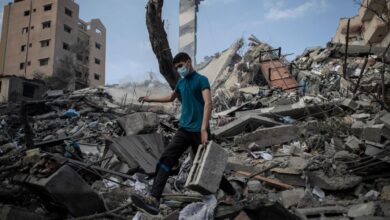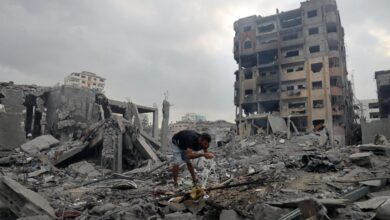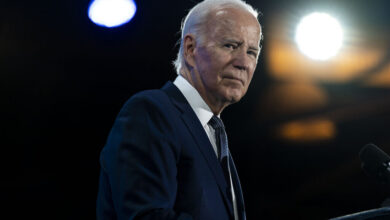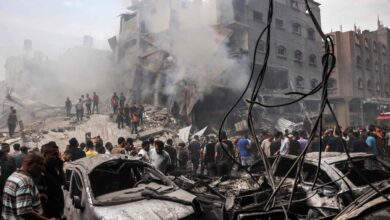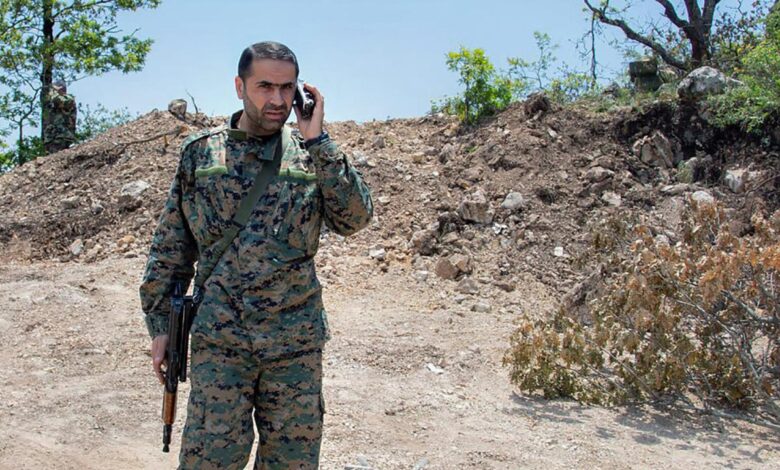
Hezbollah Leader Warns Israel Against Lebanon War
Hezbollah leader warns Israel against waging war on Lebanon, a statement that reverberates with the weight of history and the potential for a catastrophic conflict. The volatile relationship between Israel and Lebanon, marked by decades of tension and violence, is once again at a crossroads.
The current warning serves as a stark reminder of the fragility of peace and the ever-present threat of renewed hostilities in the region. This volatile situation is further complicated by the complex political landscape in Lebanon, where Hezbollah holds significant influence and power.
The warning underscores the high stakes involved, raising questions about the potential consequences of a war. The military implications are dire, with the possibility of widespread destruction and loss of life on both sides. The impact on civilian populations would be devastating, potentially displacing millions and exacerbating existing humanitarian crises.
Moreover, the conflict could have far-reaching regional and international repercussions, drawing in other actors and escalating tensions across the Middle East.
Diplomatic and Political Efforts
The relationship between Israel and Lebanon is marked by a long history of conflict and mistrust. Despite the absence of formal diplomatic relations, there have been intermittent efforts to resolve their disputes, primarily through international mediation. This section examines the current state of affairs, the role of international actors, and the potential for de-escalation and conflict resolution.
Current State of Diplomatic Relations
Israel and Lebanon officially remain in a state of war, with no formal diplomatic relations. The two countries have a heavily militarized border, with a United Nations peacekeeping force (UNIFIL) deployed along the Blue Line, the internationally recognized border between the two nations.
While there have been periods of relative calm, tensions often flare up due to various factors, including disputes over maritime boundaries, Hezbollah’s presence in southern Lebanon, and Israeli airstrikes in Syria.
Role of International Actors
International actors, particularly the United States and the United Nations, have played a significant role in mediating between Israel and Lebanon. The United States has been involved in peace talks, while the UN has provided a platform for dialogue and has deployed UNIFIL to maintain peace along the border.
The United Nations Security Council has also passed numerous resolutions related to the Israeli-Lebanese conflict, including Resolution 1701, which called for a ceasefire in the 2006 war between Israel and Hezbollah.
Potential for De-escalation and Conflict Resolution
Despite the challenges, there is potential for de-escalation and conflict resolution. Efforts to negotiate a maritime boundary agreement between Israel and Lebanon have shown some progress, which could potentially lead to economic cooperation and improved relations. However, these efforts are often hindered by internal political divisions within both countries and the continued presence of Hezbollah in southern Lebanon.
The Hezbollah leader’s warning to Israel is a stark reminder of the volatile situation in the Middle East. While tensions simmer in Lebanon, Turkey is making headlines with its own ambitions, launching its first astronaut to the International Space Station, a move that reflects President Erdogan’s growing space program.
It’s a fascinating contrast, showcasing the different ways nations are asserting their presence on the world stage, whether through military posturing or technological advancement.
Timeline of Key Events and Diplomatic Initiatives
- 2006:The Second Lebanon War erupts, leading to a UN-brokered ceasefire. Resolution 1701 is passed, calling for the disarmament of Hezbollah and the deployment of UNIFIL.
- 2010-2011:Indirect negotiations between Israel and Lebanon, mediated by the United States, take place to resolve the maritime boundary dispute.
- 2012:The UN Security Council adopts Resolution 1971, which reaffirms the commitment to a peaceful resolution of the Israeli-Lebanese conflict.
- 2017:The United States announces that it is withdrawing from the Iran nuclear deal, which raises concerns about potential regional instability.
- 2020:Negotiations between Israel and Lebanon on the maritime boundary dispute resume, with the United States acting as a mediator.
- 2022:The United States proposes a revised maritime boundary agreement, but it remains unclear whether it will be accepted by both parties.
Public Opinion and Domestic Reactions
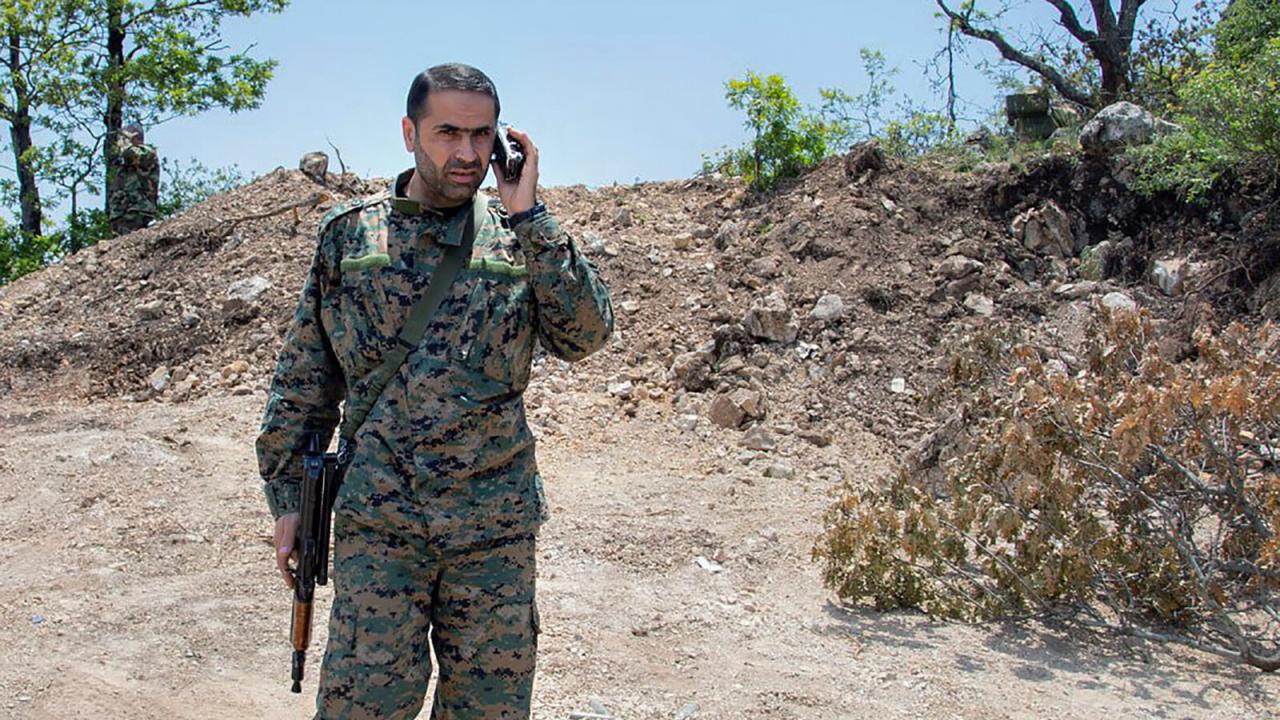
The Hezbollah leader’s warning to Israel has sparked intense debate and divided public opinion in both Lebanon and Israel. While the threat of war raises concerns about the potential for widespread destruction and loss of life, it also highlights the complex and volatile political dynamics within both countries.
Public Opinion in Lebanon
The public in Lebanon is deeply divided on the issue of war. While many citizens are wary of the potential consequences of another conflict, others believe that a strong response is necessary to deter Israeli aggression. * Pro-Hezbollah sentiment:Supporters of Hezbollah, particularly in the Shia community, view the group as a powerful deterrent against Israeli aggression and a champion of Lebanese resistance.
They are likely to rally behind the group’s leadership in the event of a conflict.
Concerns about civilian casualties
A significant portion of the Lebanese population is deeply concerned about the potential for civilian casualties and widespread destruction in the event of a war. They are calling for peaceful solutions and diplomatic efforts to resolve the conflict.
Economic concerns
The Lebanese economy is already fragile, and a war would likely have a devastating impact on the country’s infrastructure and economic activity. Many Lebanese are worried about the potential for economic hardship and instability.
Domestic Political Reactions in Lebanon
The Hezbollah leader’s warning has sparked intense debate within Lebanon’s political landscape.* Political divisions:Lebanon’s political system is characterized by deep divisions and sectarianism. The Hezbollah leader’s warning has exacerbated these divisions, with some politicians supporting the group’s stance and others calling for restraint and diplomacy.
Government response
The Lebanese government has issued statements calling for calm and urging all parties to avoid escalation. However, the government’s ability to control the situation is limited, given the powerful influence of Hezbollah.
International pressure
The tension between Israel and Lebanon is always a powder keg, and Hezbollah’s leader’s recent warning to Israel against attacking Lebanon adds fuel to the fire. While the Middle East simmers, the world is also watching Colombia struggle with devastating forest fires, as smoke blankets the capital, Bogotá , highlighting the global impact of climate change.
It seems like everywhere we look, there’s a crisis brewing, and we need to find solutions to prevent these conflicts from escalating into something much worse.
Lebanon is facing international pressure to avoid a conflict with Israel. The international community is concerned about the potential for regional instability and the humanitarian consequences of a war.
Public Opinion in Israel, Hezbollah leader warns israel against waging war on lebanon
Public opinion in Israel is also divided on the issue of war with Lebanon.* Support for military action:Some Israelis believe that a military response is necessary to deter Hezbollah and prevent the group from acquiring advanced weapons. They argue that a strong military response is the only way to ensure Israel’s security.
Concerns about civilian casualties
Others are concerned about the potential for civilian casualties and the humanitarian consequences of a war. They are calling for a diplomatic solution and urge the government to avoid military action.
The tension in the Middle East continues to simmer, with Hezbollah’s leader issuing a stark warning to Israel against any military action in Lebanon. It’s a reminder that international conflicts can escalate quickly, just like the excitement surrounding Antoine Griezmann’s achievement of becoming Atlético Madrid’s all-time top scorer here.
While Griezmann celebrates his personal triumph, the situation in Lebanon remains precarious, demanding a peaceful resolution to prevent further escalation.
Economic concerns
The Israeli economy is also vulnerable to the impact of a war. Many Israelis are worried about the potential for economic hardship and instability.
Domestic Political Reactions in Israel
The Hezbollah leader’s warning has also triggered a debate within Israel’s political landscape.* Political divisions:Israel’s political system is also characterized by divisions, with different political parties holding varying views on the best way to deal with Hezbollah.
Government response
The Israeli government has condemned the Hezbollah leader’s warning and has threatened to respond forcefully to any aggression. The government is likely to take a hard line against Hezbollah, given the group’s history of attacks against Israel.
International pressure
Israel is also facing international pressure to avoid a conflict with Lebanon. The international community is concerned about the potential for regional instability and the humanitarian consequences of a war.
Potential Impact of War on Political Stability
A war between Israel and Lebanon would have a devastating impact on the political stability of both countries.* Internal instability:The war would likely lead to internal instability and violence within both countries.
Political polarization
The war would further polarize political opinion within both countries, making it more difficult to achieve a peaceful resolution.
Regional instability
The war would have a destabilizing effect on the entire region, increasing the risk of further conflict and violence.
“The echoes of war reverberate through our streets, a grim reminder of the fragility of peace. We, the people of Lebanon, stand at a crossroads, our future hanging in the balance. Let us not be dragged into a vortex of violence, but instead, embrace the path of diplomacy and dialogue. Let us choose peace over war, and build a future where our children can live in safety and prosperity.”
Editorial in a Lebanese Newspaper
International Security Implications
A war between Israel and Lebanon would have profound consequences for the broader Middle East region, potentially destabilizing the entire area and escalating tensions beyond the immediate conflict zone. The conflict’s impact would reverberate across international security, impacting regional stability, diplomatic relations, and the global geopolitical landscape.
Potential for Regional Escalation and Involvement of Other Powers
The involvement of regional powers in a conflict between Israel and Lebanon is highly probable, given the existing alliances and rivalries within the Middle East. A war could quickly escalate, drawing in other actors, such as:
- Iran:As a key supporter of Hezbollah, Iran could be drawn into the conflict, potentially providing military aid or even direct intervention. This could significantly escalate the conflict, leading to a broader regional war.
- Syria:Given the close ties between Hezbollah and Syria, a war in Lebanon could trigger Syrian involvement. This could further destabilize the already fragile situation in Syria and lead to a wider regional conflict.
- Saudi Arabia:As a regional rival of Iran, Saudi Arabia could be drawn into the conflict in support of Israel, further escalating the situation.
- United States:The United States, a key ally of Israel, could be drawn into the conflict, providing military support or even direct intervention. This would further complicate the situation and could lead to a wider international conflict.
“A war between Israel and Lebanon would be a disaster for the entire region. It would be a conflict that could easily spill over into other countries, leading to a wider regional war.”
[Insert a reputable source or expert’s name]
Potential for Regional Instability and the Emergence of New Conflicts
A war between Israel and Lebanon could trigger a cascade of instability throughout the region, leading to the emergence of new conflicts and exacerbating existing tensions. For example:
- Increased sectarian violence:The conflict could exacerbate sectarian tensions within Lebanon and across the region, leading to increased violence and instability.
- Refugee crisis:A war in Lebanon could displace millions of people, creating a massive refugee crisis and further straining resources in neighboring countries.
- Economic disruption:The conflict could disrupt trade and economic activity in the region, leading to economic hardship and further instability.
- Rise of extremist groups:The conflict could create a power vacuum that could be exploited by extremist groups, leading to the emergence of new conflicts and instability.
Final Summary: Hezbollah Leader Warns Israel Against Waging War On Lebanon
Hezbollah’s warning serves as a critical moment in the ongoing Israeli-Lebanese conflict. The potential for war, with its devastating consequences, hangs heavy in the air. While the warning highlights the immediate threat, it also underscores the urgent need for diplomatic efforts to prevent escalation.
The international community must engage in meaningful dialogue and mediation to de-escalate tensions and seek a lasting solution to this enduring conflict. The future of Lebanon and the broader region hinges on finding a path towards peace and stability.

